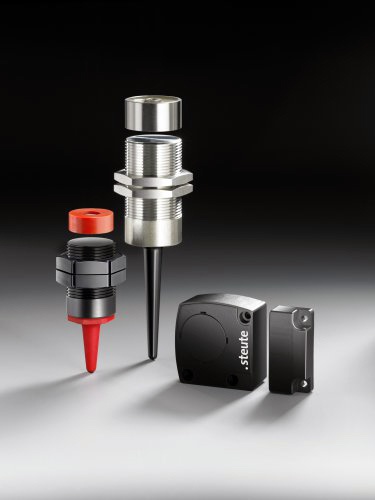Soltekin, S.L. - Proximity sensors (Reed, inductive sensors, etc)
Steute sWave
Wireless sensors for industrial automation: they allow modern and flexible production concepts

The wireless standard sWave allows modern and flexible production concepts: wireless sensors for industrial automation Steute has introduced a generation of wireless sensors that use the Protocol sWave, developed by steute for the frequency band of 868/915 MHz.
The RF RC 10, housed in a thermoplastic housing, compact and square, can be integrated flexibly during the construction of the machine. It is equipped with contacts type shank, while the wireless RF GS M25 and RF GS M30 cylindrical sensors detect the objective by the GMR effect. This gives the advantage to the users that the sensor can be mounted also on vibrating machines and plants since the vibrations can not influence the GMR effect. In this way, extends the field of application for magnetic sensors.
The wireless technology sWave multinets capability allows the use of many sensors in a single area of transmission. The bi-directional broadcast signal is one of the specialties of the wireless protocol: with a built-in delay time, recognition for each confirmation of transmission is sent.For three sensors, power is provided by a long life lasting lithium battery many years thanks to energy consumption extremely under own sWave wireless protocol. they are available for transmission of 868 ranges (Europe and Asia) and 915 MHz (America), which means that they can be applied around the world.
For three sensors, power is provided by a long life lasting lithium battery many years thanks to energy consumption extremely under own sWave wireless protocol.
Wireless sensors have been designed for the reliable detection of position without the need for cables or pipes, for applications in industrial environments. Since no cables are needed, steute electrical engineers offers the possibility of applying non-contact sensors more flexible than before. In addition, sensors are optimally adapted for integration into plants designed under the concept of "industry 4.0" and "intelligent factory", and are characterized by a decentralized intelligence and flexibility.
The RF RC 10, housed in a thermoplastic housing, compact and square, can be integrated flexibly during the construction of the machine. It is equipped with contacts type shank, while the wireless RF GS M25 and RF GS M30 cylindrical sensors detect the objective by the GMR effect. This gives the advantage to the users that the sensor can be mounted also on vibrating machines and plants since the vibrations can not influence the GMR effect. In this way, extends the field of application for magnetic sensors.
The wireless technology sWave multinets capability allows the use of many sensors in a single area of transmission. The bi-directional broadcast signal is one of the specialties of the wireless protocol: with a built-in delay time, recognition for each confirmation of transmission is sent.For three sensors, power is provided by a long life lasting lithium battery many years thanks to energy consumption extremely under own sWave wireless protocol. they are available for transmission of 868 ranges (Europe and Asia) and 915 MHz (America), which means that they can be applied around the world.
For three sensors, power is provided by a long life lasting lithium battery many years thanks to energy consumption extremely under own sWave wireless protocol.
Wireless sensors have been designed for the reliable detection of position without the need for cables or pipes, for applications in industrial environments. Since no cables are needed, steute electrical engineers offers the possibility of applying non-contact sensors more flexible than before. In addition, sensors are optimally adapted for integration into plants designed under the concept of "industry 4.0" and "intelligent factory", and are characterized by a decentralized intelligence and flexibility.


